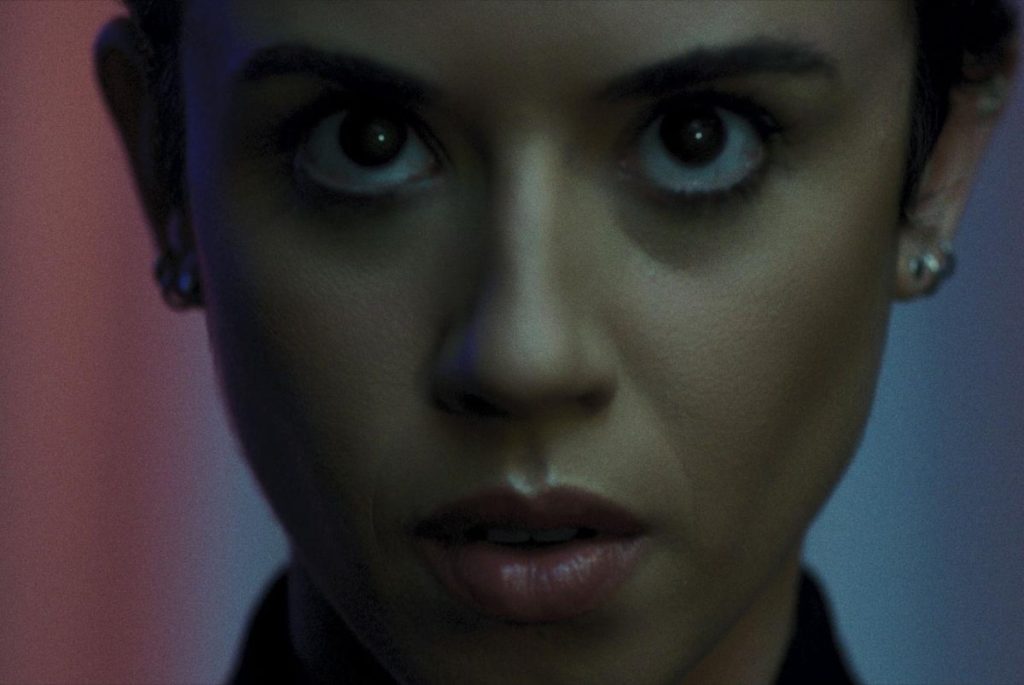1 of 5 | Jenna Kanell stars in and co-wrote “Faceless After Dark.” Photo courtesy of Screamfest
LOS ANGELES, Oct. 12 (UPI) — Faceless After Dark, which screened at the Screamfest horror film festival, is a clever revenge tale showcasing Jenna Kanell as an actor and co-writer.
Kanell stars as Bowie Davidson, an actress from a horror movie in which she battled a killer clown. The cheesy dialogue she was saddled with has become the catchphrase all her fans at conventions ask her to say.
One night, a fan wearing the killer clown costume breaks into Bowie’s house. Bowie overcomes her attacker but decides not to stop there.
The attack inspires Bowie to engage with fans who have been harassing her on social media. Bowie meets some of the most toxic trolls and dispatches violent justice.
Kanell, who co-wrote with Todd Jacobs, also starred in the real killer clown movie Terrifier. Their attention to the realities of the lives of working actors grounds the outrageous violence.
Bowie navigates appearance fees, likeness rights and union health insurance. Her girlfriend (Danielle Lyn) books a superhero movie and Bowie records Cameos to supplement her convention appearances until her next film.
The prologue of Faceless After Dark breeze through a lot of this, but these are real issues actors have to deal with. Entitled fans may think actors are rich if they starred in one movie, but it’s a daily grind for most actors, even the gainfully employed ones.
Bowie also resents her friend Ryan (Danny Kang), who comes from money and can afford to spend time generating his own projects. Bowie is not especially tactful about it, but portraying her hostility also shows the real differences that exist in tiers of the entertainment industry.
Kanell is immersed in the world she’s portraying both behind and in front of the camera, but one doesn’t even need to be a horror fan to relate. Anyone can be sick of the online abuse actors like Kelly Marie Tran, John Boyega, Millie Bobby Brown and many more endured.
Bowie’s revenge is already wish fulfillment for spectators. Actors who have experienced some form of harassment will probably relish it even more.
Director Raymond Wood doesn’t scrimp on the gore. Each of Bowie’s kills is unique and graphic enough to put the toxic fans in their place, from a safe cinematic distance.
Nobody is endorsing actually taking violent action on trolls, but it is the most dramatic way to vicariously depict the catharsis thinking about it might bring.
In between horror set pieces, Wood maintains a steady frame. The action is clear, sometimes with elegant slow-motion flourishes.
The camera also lingers on Kanell in closeup for long takes during which she displays extreme ranges of emotions. The only exceptions are strobing scenes, mimicking the chaotic editing Kanell uses to assemble a video of her work.
The film opens with a strobe warning, and that is accurate. So the strobing issue may make it untenable for some viewers, but otherwise Faceless After Dark is a slick production that frames its outrageous premise in the language of mainstream cinema.
Faceless After Dark is a vehicle to showcase Kanell pushed to her limits and thriving. The story delivers in its modern-day revenge fantasy, too.
Fred Topel, who attended film school at Ithaca College, is a UPI entertainment writer based in Los Angeles. He has been a professional film critic since 1999, a Rotten Tomatoes critic since 2001, and a member of the Television Critics Association since 2012 and the Critics Choice Association since 2023. Read more of his work in Entertainment.

